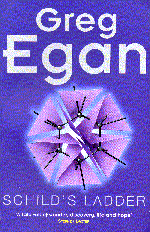|
Schild's Ladder
Copyright 2001 by
I first read this on the 23rd November 2002. The Sarumpaet Rules have been the scientific foundation of future civilisation for twenty-thousand years. Their mathematical graphs define the elementary particles of our universe. Their discovery has allowed humanity to spread across the universe on a wave of technological innovation. Their validity has been unquestioned. But now Cass has devised an experiment to test one aspect of this view of reality more accurately than has ever been done. She'll discover that the rules are perhaps not quite sufficient or complete. She'll also discover that she's made a grave blunder. Her experiment has created a "novo-vacuum", a new form of emptiness, filled with a radically different set of physical laws. This novo-vacuum is expanding, out of control, very very fast. Six hundred years later, more than two hundred systems have been consumed by this vast expanding sphere. On the space habitat Rindler, monitoring the growing sphere, retreating as the sphere expands, people from across the galaxy come to observe and study the phenomena, to seek how to understand it and perhaps how to destroy it. Tchikaya and Yann are two scientists who don't want to destroy this manifestation of a new physics, They believe the loss of planets and the evacuation of billions of people is a acceptable price to pay. They believe that this novo-vacuum may hold new forms of life, and life is previous in this future galaxy where traces of alien life have been few and far between. However others on the Rindler, seeking to preserve humanity's planets, would destroy whatever may exist in this new reality, so the race is on. Greg Egan has really got into this hard-science, big question vein of writing. Of course, I've no idea whether it's really hard science. I'm ludicrously out of my depth with this cosmological mathematical stuff. For example, take a gander at this: So decoherence hides super positions of different charge states from us, but not different position states. Our failure looks classical, our success is quantum mechanical.And that is just the conclusion of a complicated argument. Anyway in amongst this wondrous future world there's still time for rebel attacks, for exploration of this novo-vacuum, some humour and some excitement. I really can't judge this novel. It's an achievement, like his earlier work "Diaspora", but is it particularly successful as a novel? I'll get a better idea on a second reading, but that won't be soon. I still prefer his "Quarantine". Loaded on the 27th December 2002.
|
|






